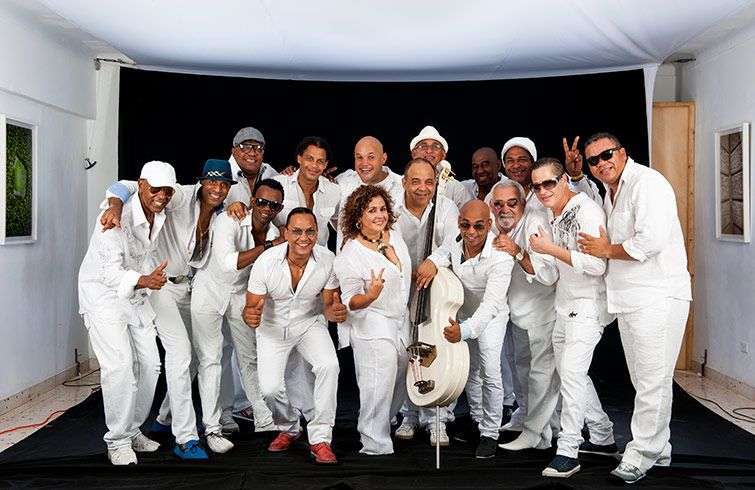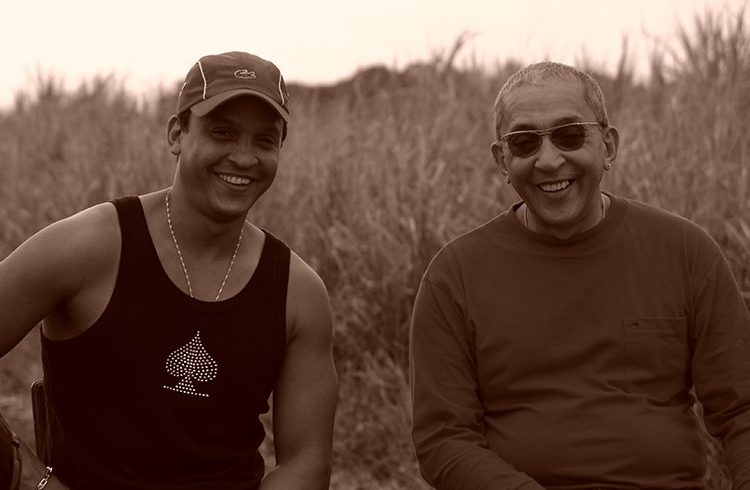There is no musician in Cuba today who is under more pressure than Samuelito Formell…. The reasons are obvious: on top of leading the future of the band Los Van Van, it is his responsibility to oversee the stability of a symbol and the survival of a legend. So this reporter approached him to bring our readers up to date about the celebrated band.
Samuelito…what do you think was the greatest lesson that you learned from your father for the day when you would be leading Los Van Van?
The greatest lesson was watching him, from the time I was a child, setting up numbers, directing the albums, composing at home, arranging…. From a very young age, I loved the music that my father made. I studied music and chose percussion, and then I was always following Changuito…. I think that was the greatest lesson, the natural one, the one that influenced me, that has stayed with me all of my life. After he decided that I should lead the band, it was also about being with him all the time, and him giving me the opportunity to watch him direct the production of so many albums, not just of Los Van Van, but also the ones he did with Virulo, Silvio, and Pablo, and music for the movie Los pájaros tirándole a la escopeta (Tables Turned)…. As a child, I was able to enjoy all of that—him making music, and then going with him to the studio. I went everywhere with him, so he taught me a lot, without my realizing it, so that afterward I knew what it meant to direct an album…and lead a band.
They say that every maestro has his little book…as bandleader, what is yours for Los Van Van?
The ‘little book’ for leading a band has not changed much from what my father laid down. Discipline is the thing you need most. With discipline, you can go places…. When there’s discipline, the musical ideas flow, there’s good energy and everything works right. For the band-leading part, the musical part, the type of music that we make—the sound of each song—is very important, fundamental; it seems like something simple, but it’s not. Not all songs are the same…and if you don’t get the right sound, the public might not dance, and that’s the worst thing that can happen. There might be different ways of setting up a song; I work the bass first, and my father used to set up songs with all of the musicians together. I prefer to set up the bass first the way it’s done in the studio, and see the details that you can set with the bass, because those are the foundations of a song…and, well, afterward, I polish off the arrangements for the other instruments in a different way.
Right now you’re recording a new album with the EGREM label. What does Los Van Van have in store for its 45th anniversary?
My father worked hard on this new album… he always called it “La fantasía” (“the fantasy”), because when he went to the Latin Grammy Awards, he wanted to treat himself to watching some of the Las Vegas shows—the magician David Copperfield and others. He was really impressed by things like that, where you have no idea what might happen, you know…and that make you experience an amazing fantasy, just for a moment, as he used to say. He brought that concept: that the world is a fantasy, and that sometimes you have to be a daydreamer about a lot of things. We began to think about songs for the album, and a little bit before the events, they had been chosen. But the arrangements hadn’t been done for all of them; some were planned in one way and ended up differently; and for others, his final idea never made it….
There’s one thing that’s really nice…he had planned to do something with a song by my grandfather. We’re not going to do it yet, because I’m not really clear on what my father wanted, but I’m going back over some recordings that my father did at home, to try to find more than what he told me, to give me more clarity. So I would include this song on a future album. None of them are called “La fantasía,” but I remembered that he had created a song for [singer] Luna Manzanares, where all of the lyrics are a fantasy; he talks about a pianist who plays keys that are colors. And to justify the title, I called it “La fantasía,” and we are going to use my father’s voice singing it, joined by the voices of Yenny and La Camerata; it is an arrangement by the new pianist…it’s really a beautiful thing. It will be an album that is going to have a real impact. There are four songs by Juan Formell, a song by Mandy, who is making his debut as a composer, which will be the album’s opening, and one of the ones that my dad worked on, called “Añejo,” which talks about the songo, and about Los Van Van. There are also two by Leliebre, two by Robertón, two of mine, one by my brother Juan Carlos and one by Juancito.
When will it be ready?
The idea is to have it out by December, to celebrate the band’s 45th anniversary. We’re pressed for time, because we have a lot of commitments. We want to at least bring out a single with one or maybe two songs at the concert that we’ll be playing at P and 23 [streets] on December 4th—the same place where Los Van Van played its first concert—and for the album to be finished before the end of the year.
When Van Van reaches its 50th anniversary, what would you like to tell its dancing public?
Hmm! For them to keep saying that Van Van is going to be around for a while, that this is a story that will never die, because it’s become a national symbol, an emblem of Cuba, and of Cuban music. Throughout our history, that’s been the case with bands like Orquesta Aragón and other greats, but in the period in which Los Van Van started out, I think that my father did a lot to change the concept of Cuban music and the people fell in love with to the extent that, well, look at the refrain, “Don’t try to make out like you’re the Van Van,” which is like saying “It’s the greatest!” Or “It’s the best!” And that is what the people say. When I look at the case of La Colmenita, performing music that is mostly at least 45 years old, and seeing how those children can perform it practically with the same flavor, while at the same time other kids who go to see them want to dance and sing to that music, that’s a really great thing.
A bit earlier we talked about Los Van Van as a national symbol. What does it mean to you and your band to be a symbol of Cuba?
A big commitment to our country and to the people of Cuba; when you get up there, people ask you what you’re doing, and say to you: “you can’t go down….” It’s a commitment that you have; it’s not a problem, or a worry, but you have to be on top of that. It’s something beautiful, a legacy of my father’s that has to be defended. I have a super-big responsibility, and making sure that this band doesn’t go down is what’s most important to me.










